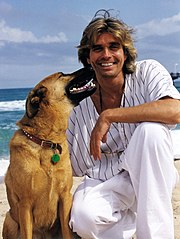Alex Pacheco
Alexander Fernando Pacheco (born August 1958 in Joliet , Illinois ) is an American animal rights activist . He is the co-founder and former chairman of People for the Ethical Treatment of Animals (PETA), founder of All American Animals, and 1-800-Save-a-Pet.com .
Life
Pacheco was born in Joliet , Illinois in 1958 to a doctor and nurse, but his family soon moved to Mexico. They left Mexico when Pacheco was in middle school and moved to Ohio , then Indiana and Illinois. Kathy Snow Guillermo writes in Monkey Business that Pacheco showed an early interest in animals.
He rejected his original plans to become a priest when he saw the handling of the animals during a visit to a meat factory. A friend gave him a copy of Peter Singer's book Liberation of the Animals , which led him to adopt a vegetarian diet. Pacheco then attended Ohio State University , where he launched the first campaigns against the exploitation of animals.
On March 20, 1995, he was awarded the Courage of Conscience Prize by The Peace Abbey .
Actions
Pacheco first got a lot of publicity in 1981 when he tried to stop the use of 17 crab monkeys for animal experiments at the Institute of Behavioral Research in Silver Spring . In the bio-laboratory, monkeys had their nerve connections to limbs removed and then they were forced to use the limbs (which they could not feel) by electric shocks. Pacheco, who was employed, reported the responsible psychologist Edward Taub for violating animal welfare laws . The police searched the lab and confiscated the monkeys. Taub was charged, convicted, but acquitted after an appeal in part on formal grounds. The dispute over the animals went as far as the Supreme Court and attracted a lot of attention at PETA . The ruling had an impact on animal welfare legislation, with the Animal Welfare Act of 1985 passed following hearings on the case.
Oliver Stone later said that Pacheco's campaign gave birth to the animal rights movement in the United States .
Individual evidence
- ↑ Kathy Snow Guillermo: Monkey Business . National Press Books, 1993, pp. 30-33.
- ↑ List ( memento of June 10, 2014 in the Internet Archive ) on the official website of The Peace Abbey
- ↑ David Johnson. Review of The Mind and the Brain: Neuroplasticity and the Power of Mental Force
- ^ Peter Carlson, "The Strange Case of the Silver Spring Monkeys," The Washington Post, February 24, 1991.
| personal data | |
|---|---|
| SURNAME | Pacheco, Alex |
| ALTERNATIVE NAMES | Pacheco, Alexander Fernando (full name) |
| BRIEF DESCRIPTION | American animal rights activist |
| DATE OF BIRTH | August 1958 |
| PLACE OF BIRTH | Joliet , Illinois , United States of America |
